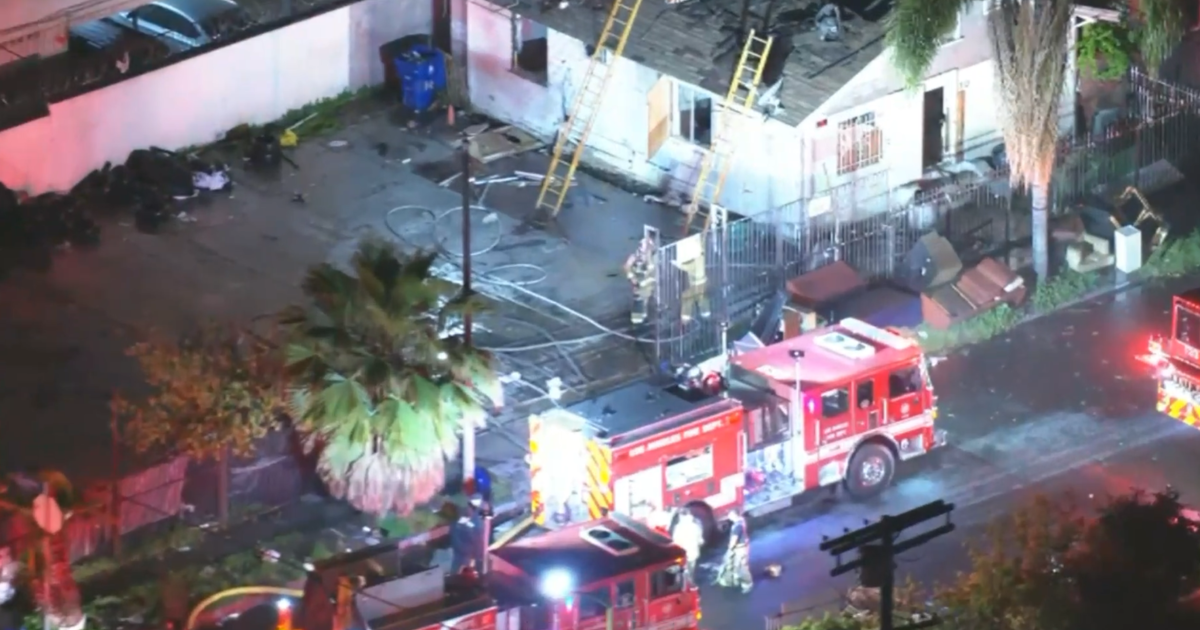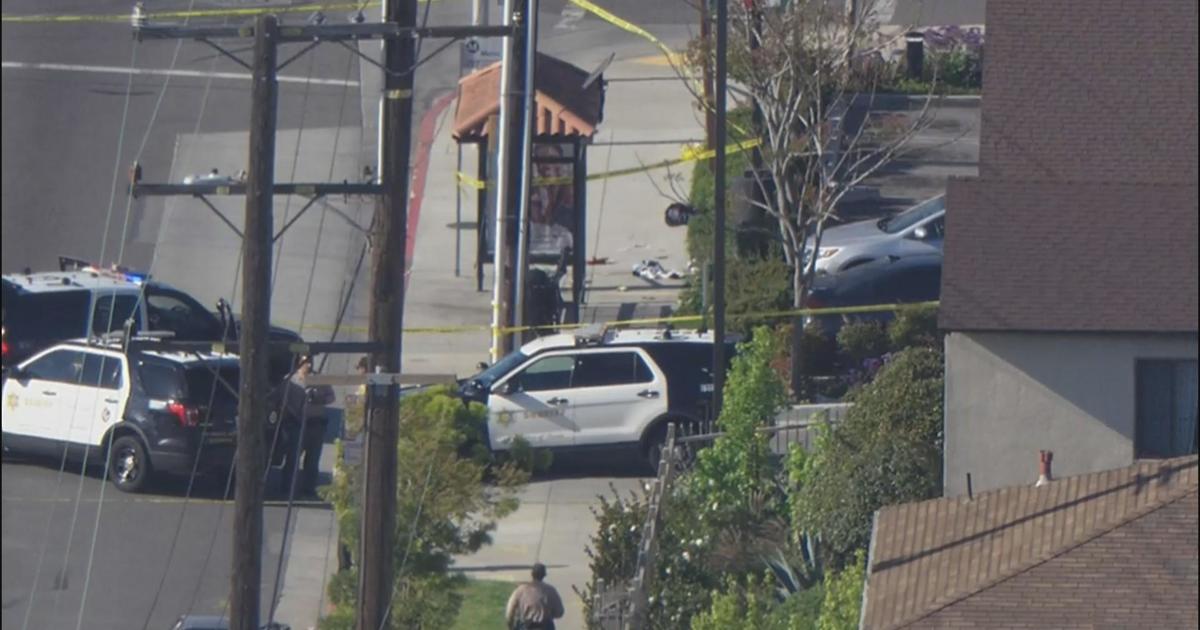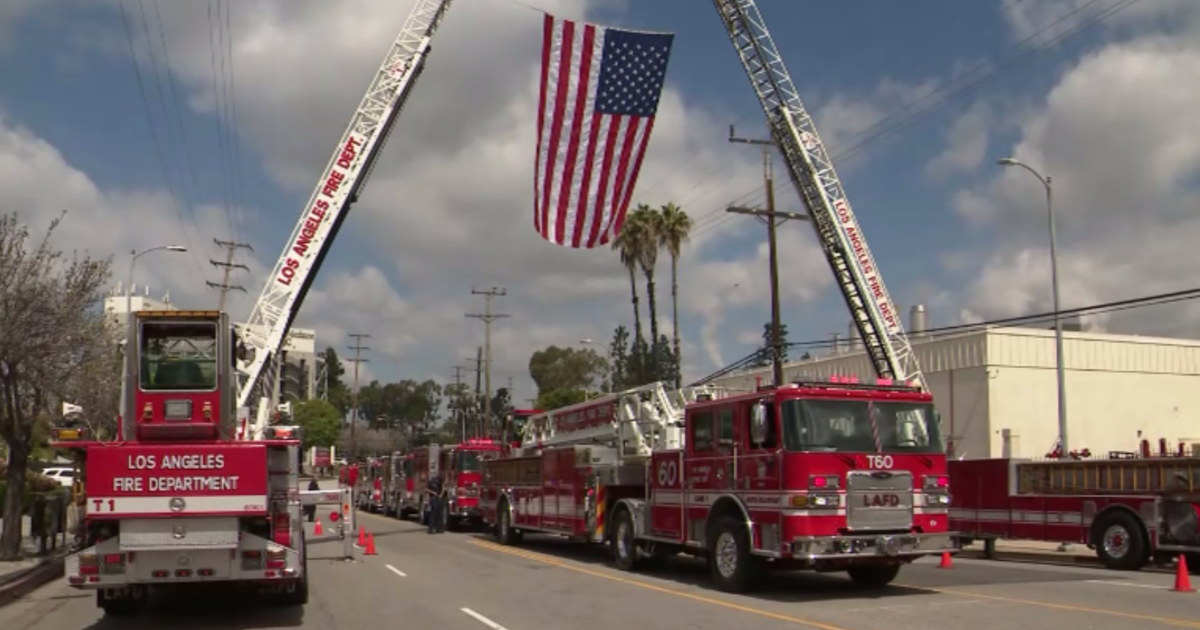Cal Fire Firefighters Fight For Higher Pay
SACRAMENTO (CBSLA.com/AP) — Dozens of Cal Fire firefighters went on the attack Monday. But this time, their target was state lawmakers.
Wearing red T-shirts that read: "Cal Fire Firefighters in Crisis," protesters gathered outside the Cal Fire headquarters in downtown Sacramento to protest low pay.
The Cal Fire union says city and county fire agencies pay firefighters far more to do the same job than Cal Fire, which is a state agency.
The union had been pushing for higher wages for several months, but negotiations with the state came to a halt.
"Does it make sense that California's own salary survey reports that Cal Fire firefighters are between 30 and 90 percent underpaid?" asked one ad campaign launched by the union in an effort to urge lawmakers to boost their salaries.
"Culturally as firefighters, we don't often ask for help. That is just not in our nature. But right now, we are asking for the public's help," said Cal Fire firefighter Mike Alvarado.
The union is using the Blue Cut Fire as just one example, where firefighters from across the state were working side by side - doing the same exhausting work, but with unequal compensation.
"All the local fire departments in the state of California work a 56-hour work week. Our members work a 72-hour work week. That's three days on straight, four days off. Right now, we have members that have been stuck on duty for 24- 33 days because of the fires. What they're getting paid is one third less than their counterparts in local government," said Tim Edwards of Cal Fire Local 2881 Rank and File Director.
Brian Foxvog, who lives in the fire zone, said the pay issue is complicated, but he understands where the firefighters are coming from. "I think if you take a certain level, there should be equality."
The governor's office said it will not comment on specifics of the bargaining sessions. A spokesman only said firefighters are heroes, but the state has to consider 21 other bargaining units.
California's state fire department is stretched thin just as the bone-dry state enters the peak of its wildfire season, with vacancy rates exceeding 15 percent for some firefighters and supervisors.
The vacancy rate is more than 10 percent for some fire engine drivers, according to statistics provided to The Associated Press.
A five-year drought and changing weather patterns have transformed what once was a largely summertime job into an intense year-round firefight, said California Department of Forestry and Fire Protection spokeswoman Janet Upton.
"It's not the old days where we were a seasonal department with a season that lasted a few months," she said. "It's an increasingly challenging job, no thanks to Mother Nature and climate change."
The shortage means that the state firefighting department is forced during weather conditions fanning large blazes to keep firefighters on duty for long hours as they do backbreaking, dangerous work trying to put out massive wildfires that have become bigger and more frequent in recent years.
Nearly 25 percent of departing employees over the last two years have told officials they quit for better-paying jobs with other firefighting agencies, according to the statistics provided to the AP by Cal Fire.
The union that represents the state firefighters who fight fires outside urban and suburban areas blamed low pay, as more than 100 members, families and representatives of other unions protested in Sacramento on Monday.
Union and department officials said California has enough state firefighters to keep the public safe — at the expense of firefighting men and women who frequently work for weeks without days off without seeing their families.
"We're short-staffed, we're stretched thin, we're in these epidemic fire conditions," said Patrick Walker, 40, a CalFire captain in San Diego County.
He worked 47 straight days fighting one large fire last year and said he worked three weeks with no break this year, most of it fighting a Monterey County fire that has burned more than 134 square miles.
"With the pay inequities, the shifts we work and the turnover, we're running less and less people," Walker said. "There may be a concern where the public is at risk due to the long hours."
Union members are seeking a mid-contract pay raise that would give compensation above the $60,000 a typical firefighter is paid each year in salary and overtime. Fire captains typically make more than $85,000 and the salaries of battalion chiefs exceed $98,000.
A 2014 study by the state's human resources department found state firefighters receive one-third less in pay and benefits, on average, than their counterparts at fire departments for 18 California cities and two counties surveyed.
The state firefighting department is responsible for preventing and fighting wildfires over terrain that covers about a third of California — more than 48,000 square miles spanning the Sierra Nevada foothills and the coastal mountain ranges from Santa Barbara to the Oregon border.
The federal government primarily handles firefighting at higher elevations, while local agencies are responsible for urban and suburban firefighting.
The department's survey of departing employees supports the union's complaint that there is a sizable exodus for better-paying jobs, although state officials could not immediately say if vacancy or departure rates were higher than in previous years.
State firefighter union president Mike Lopez said firefighters received a 4 percent increase last year after the minimum wage paid to entry-level firefighters rose to $10 an hour.
But the union wants the state to shorten the standard 72-hour work week that includes overtime and increase pay to bring state firefighters closer to the 56-hour standard workweek for urban firefighters.
Negotiations for higher state firefighter pay broke down about four months ago after Gov. Jerry Brown's administration made a last offer that the union rejected as unacceptable. Lopez declined to reveal the offer, which he said was not disclosed to the union's membership.
Administration spokesman Brian Ferguson called firefighters "everyday heroes," but added in a statement that "the state must balance the needs of many different bargaining units and the overall state budget."
State firefighters' duties have changed as they try to protect an increasing number of rural homes built in the midst of tinder-dry brush and trees, a problem that continues to grow, said University of California, Riverside, professor Richard Minnich, who studies fire ecology.
"Maybe people are leaving because it's too damn dangerous," he said. "In urban firefighting, not only are the hours more reasonable but they're also looking mostly at single structure events."
(TM and © Copyright 2015 CBS Local Media, a division of CBS Radio Inc. and its relevant subsidiaries. CBS RADIO and EYE logo TM and copyright 2015 CBS Broadcasting Inc. Used under license. All Rights Reserved. This material may not be published, broadcast, rewritten or redistributed. The Associated Press contributed to this report.)



